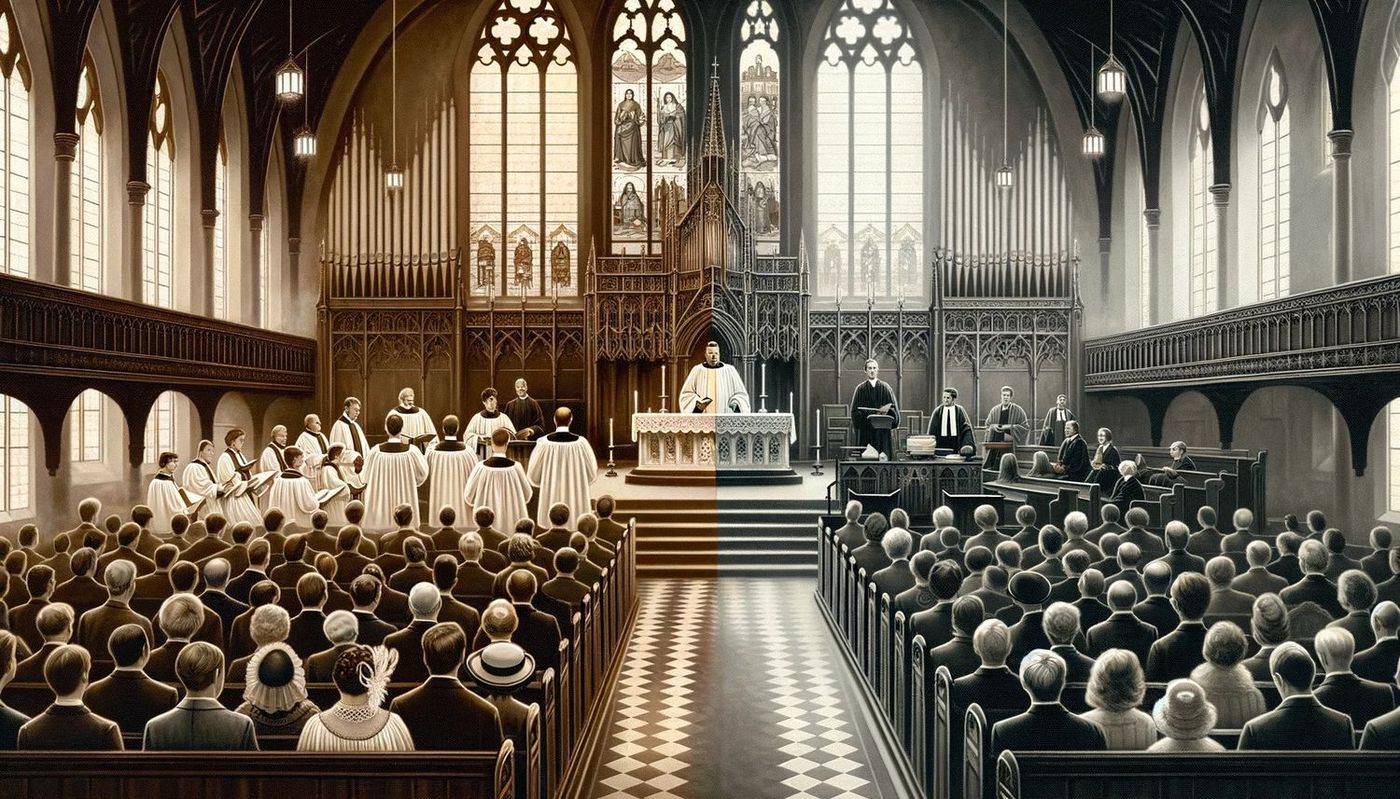Home>Theology and Spirituality>What Is The Difference Between Baptist And Presbyterian Beliefs


Theology and Spirituality
What Is The Difference Between Baptist And Presbyterian Beliefs
Published: February 20, 2024
Peter Smith, Editorial Director at Christian.net, combines deep insights into faith, politics, and culture to lead content creation that resonates widely. Awarded for his contributions to religious discourse, he previously headed a major organization for religious communicators, enhancing dialogue on faith's societal impacts.
Discover the contrasting beliefs of Baptists and Presbyterians in theology and spirituality. Explore the differences in their doctrines and practices.
(Many of the links in this article redirect to a specific reviewed product. Your purchase of these products through affiliate links helps to generate commission for Christian.net, at no extra cost. Learn more)
Table of Contents
Introduction
Baptist and Presbyterian beliefs are two prominent branches within Christianity, each with its own distinct theological perspectives and practices. While both share a common foundation in the Christian faith, they diverge on various doctrinal and ecclesiastical matters. Understanding the differences between Baptist and Presbyterian beliefs is essential for gaining insight into the rich tapestry of Christian traditions.
These two denominations have evolved over centuries, shaped by historical events, theological debates, and cultural influences. The divergent paths they have taken have led to unique interpretations of scripture, worship practices, and ecclesiastical structures. Exploring the historical and theological nuances of Baptist and Presbyterian beliefs provides a deeper appreciation for the diversity and complexity within the Christian faith.
In this article, we will delve into the historical background of Baptist and Presbyterian beliefs, examining the key events and figures that have shaped their development. We will also explore the theological differences between these two traditions, shedding light on their distinct perspectives on salvation, predestination, and the nature of the church. Additionally, we will examine their views on baptism and communion, as well as their approaches to church governance and structure.
By navigating the theological terrain of Baptist and Presbyterian beliefs, we aim to foster a greater understanding of the nuances that distinguish these traditions. Through this exploration, readers will gain valuable insights into the diverse expressions of Christian faith and the profound impact of historical, theological, and ecclesiastical factors on the development of religious traditions.
Historical Background of Baptist and Presbyterian Beliefs
The historical roots of Baptist and Presbyterian beliefs can be traced back to the tumultuous landscape of the Protestant Reformation in the 16th century. The Reformation, ignited by figures such as Martin Luther and John Calvin, sparked a wave of theological and ecclesiastical transformations across Europe. Amid this fervent climate of religious upheaval, distinct theological perspectives and ecclesiastical structures began to take shape, laying the groundwork for the emergence of diverse Protestant traditions.
The Baptist tradition has its origins in the radical reform movements of the 16th century, particularly in England. Influenced by the Anabaptist movement on the European continent, early Baptists emphasized the believer's baptism, advocating for the separation of church and state and championing religious liberty. The 17th century witnessed the proliferation of Baptist congregations, marked by a commitment to congregational autonomy and a fervent adherence to the authority of scripture.
In contrast, Presbyterianism traces its lineage to the teachings of John Calvin and the Reformed tradition. The Presbyterian Church emerged in Scotland during the 16th century, gaining momentum under the leadership of John Knox. The Presbyterian form of church government, characterized by a system of elders and a connectional structure, became a defining feature of this tradition. Presbyterianism also took root in other regions, including England and the American colonies, where it flourished and diversified over time.
The historical trajectories of Baptist and Presbyterian beliefs reflect a complex interplay of theological, cultural, and political dynamics. While both traditions emerged within the broader context of the Protestant Reformation, they evolved along distinct paths, shaped by diverse theological influences and historical contingencies. The Baptist and Presbyterian traditions have weathered periods of persecution, theological debates, and internal divisions, contributing to the rich tapestry of Christian history.
As we delve into the historical background of Baptist and Presbyterian beliefs, it becomes evident that their development was intricately intertwined with the broader currents of religious and social change. The enduring legacies of key figures, theological debates, and ecclesiastical developments have left an indelible mark on these traditions, shaping their theological outlooks and ecclesiastical structures for centuries to come.
Theological Differences between Baptist and Presbyterian Beliefs
The theological variances between Baptist and Presbyterian beliefs encompass a wide array of doctrinal and ecclesiastical aspects, reflecting their divergent interpretations of scripture and theological emphases. One of the central theological disparities lies in their perspectives on baptism and communion. Baptists adhere to believer's baptism, emphasizing the symbolic immersion of individuals who have professed their faith in Christ. This practice underscores the autonomy of the local congregation and the voluntary nature of baptism. In contrast, Presbyterians practice infant baptism, viewing it as a sign of God's covenant faithfulness and the incorporation of children into the community of faith. This theological dissimilarity underscores contrasting views on the nature and recipients of baptism within these traditions.
Furthermore, the theological differences between Baptists and Presbyterians extend to their understanding of church governance and structure. Baptists emphasize congregational autonomy, wherein each local church is self-governing and independent. This congregational polity reflects a commitment to the priesthood of all believers and the authority of the local assembly in matters of faith and practice. Conversely, Presbyterians adhere to a connectional form of government, characterized by a system of elders and regional and national assemblies. This Presbyterian polity underscores the interdependence of congregations and the collective discernment of church leadership, reflecting a distinct ecclesiastical structure.
Another theological divergence pertains to the doctrines of salvation and predestination. While both traditions affirm the sovereignty of God, they diverge in their understanding of predestination and the nature of divine grace. Baptists typically emphasize individual free will and personal faith as central to salvation, underscoring a believer's conscious decision to follow Christ. In contrast, Presbyterians adhere to the Reformed doctrine of predestination, emphasizing God's sovereign election and the irresistibility of divine grace in the salvation of individuals. This theological contrast reflects differing perspectives on the role of human agency and divine sovereignty in the redemptive process.
In navigating the theological differences between Baptist and Presbyterian beliefs, it becomes evident that these traditions embody distinct theological emphases and doctrinal perspectives. The nuanced theological variances underscore the diverse interpretive lenses through which these traditions approach scripture, ecclesiology, and soteriology. By exploring these theological disparities, one gains a deeper appreciation for the rich tapestry of Christian thought and the multifaceted expressions of faith within the Baptist and Presbyterian traditions.
Views on Baptism and Communion
The views on baptism and communion held by Baptist and Presbyterian traditions encapsulate fundamental theological distinctions that shape their worship practices and ecclesiastical identities. Baptism, a sacrament symbolizing initiation into the Christian faith, serves as a focal point of divergence between these two traditions. Baptists adhere to believer's baptism, emphasizing the symbolic immersion of individuals who have professed their faith in Christ. This practice underscores the autonomy of the local congregation and the voluntary nature of baptism, reflecting a commitment to the principle of individual faith as a prerequisite for baptism. In contrast, Presbyterians practice infant baptism, viewing it as a sign of God's covenant faithfulness and the incorporation of children into the community of faith. This theological dissimilarity underscores contrasting views on the nature and recipients of baptism within these traditions.
Similarly, the observance of communion, also known as the Lord's Supper or the Eucharist, reflects divergent theological perspectives within the Baptist and Presbyterian traditions. Baptists typically adhere to the doctrine of "memorialism," wherein the Lord's Supper serves as a symbolic remembrance of Christ's sacrificial death and a communal expression of faith. The emphasis is placed on the spiritual significance of the elements and the act of partaking in remembrance of Christ's atoning work. In contrast, Presbyterians hold to the Reformed understanding of the Lord's Supper, wherein the sacrament is viewed as a means of grace and spiritual nourishment. This perspective emphasizes the real presence of Christ in the elements and the spiritual communion of believers with Christ and with one another.
The theological variances in the views on baptism and communion between Baptists and Presbyterians reflect their distinct interpretations of scripture, ecclesiology, and sacramental theology. These differences not only shape the worship practices and liturgical expressions of each tradition but also underscore their theological emphases and ecclesiastical identities. By examining the nuanced perspectives on baptism and communion within the Baptist and Presbyterian traditions, one gains valuable insights into the diverse theological frameworks that inform their sacramental practices and their understanding of the Christian journey of faith.
Church Governance and Structure
The ecclesiastical governance and structural frameworks of Baptist and Presbyterian traditions embody distinct organizational paradigms that reflect their theological emphases and ecclesiastical identities. Baptists adhere to a congregational form of church governance, wherein each local congregation exercises autonomy in matters of faith and practice. This congregational polity underscores the priesthood of all believers and the authority of the local assembly, reflecting a commitment to the self-governing nature of individual churches. Decisions regarding doctrine, leadership, and church affairs are typically made by the congregation, often through a democratic process involving the participation of church members. This emphasis on congregational autonomy underscores the value placed on the individual believer's role in the life of the church and the collective discernment of the local assembly.
In contrast, Presbyterians adhere to a connectional form of church government, characterized by a system of elders and a hierarchical structure of regional and national assemblies. This Presbyterian polity emphasizes the interdependence of congregations and the collective discernment of church leadership. Elders, elected by the congregation, form sessions at the local level and participate in the governance and pastoral care of the church. These sessions are further connected to presbyteries, which encompass multiple congregations, and ultimately to broader assemblies at the regional and national levels. This connectional structure reflects a commitment to shared governance, mutual accountability, and the collective discernment of church leadership and decision-making.
The contrasting approaches to church governance and structure within Baptist and Presbyterian traditions underscore their divergent perspectives on ecclesiastical authority, leadership, and the nature of the church. While Baptists prioritize congregational autonomy and the direct involvement of church members in decision-making, Presbyterians emphasize the collective discernment of church leadership and the interconnectedness of congregations within a broader hierarchical framework. These distinct organizational paradigms not only shape the governance and administrative processes of each tradition but also reflect their theological commitments and ecclesiastical identities.
By examining the nuanced differences in church governance and structure between Baptist and Presbyterian traditions, one gains valuable insights into the diverse ecclesiastical frameworks that inform their organizational dynamics and the exercise of authority within the church. These structural paradigms not only reflect the historical development of each tradition but also underscore their enduring commitment to ecclesiastical governance and the cultivation of vibrant Christian communities.
Salvation and Predestination
Salvation and predestination stand as pivotal theological concepts that illuminate the contrasting perspectives of Baptist and Presbyterian beliefs. While both traditions affirm the sovereignty of God in the redemptive process, they diverge in their understanding of predestination and the nature of divine grace.
Baptists typically emphasize individual free will and personal faith as central to salvation. Rooted in the principle of believer's baptism, Baptists underscore a believer's conscious decision to follow Christ as essential for salvation. This emphasis on personal agency and the voluntary nature of faith reflects a commitment to the autonomy of the individual in responding to the gospel message. The act of conversion, characterized by a personal confession of faith and a public profession of belief, holds significant importance within Baptist theology, underscoring the transformative experience of salvation as a conscious choice made by the individual.
In contrast, Presbyterians adhere to the Reformed doctrine of predestination, emphasizing God's sovereign election and the irresistibility of divine grace in the salvation of individuals. Rooted in the theological framework of John Calvin, Presbyterian theology underscores the divine initiative in the redemptive process, highlighting God's foreordained plan for the salvation of the elect. This perspective emphasizes the unconditional nature of divine grace, wherein God's sovereign will determines the eternal destiny of individuals, irrespective of their merit or works. The doctrine of predestination, intricately woven into Presbyterian theology, reflects a profound reliance on God's sovereignty and the mysterious workings of divine providence in the unfolding of salvation history.
The theological contrast between Baptist emphasis on individual free will and Presbyterian adherence to the doctrine of predestination underscores divergent perspectives on the role of human agency and divine sovereignty in the redemptive process. While Baptists accentuate the voluntary response of the individual to the gospel message, Presbyterians underscore the unfathomable depths of God's grace and the inscrutable nature of divine election.
By navigating the theological nuances of salvation and predestination within Baptist and Presbyterian beliefs, one gains a deeper appreciation for the diverse interpretive lenses through which these traditions approach the redemptive work of God. These theological perspectives not only shape the soteriological frameworks of each tradition but also underscore their distinct theological emphases and doctrinal commitments.
Conclusion
In conclusion, the exploration of Baptist and Presbyterian beliefs unveils a rich tapestry of historical, theological, and ecclesiastical nuances that distinguish these two traditions within Christianity. The historical background of Baptist and Presbyterian beliefs reflects the complex interplay of theological influences, cultural dynamics, and ecclesiastical developments that have shaped their distinct trajectories. From the radical reform movements of the 16th century to the enduring legacies of key figures such as John Calvin and John Knox, the historical roots of these traditions have left an indelible mark on the landscape of Christian history.
The theological differences between Baptist and Presbyterian beliefs encompass a wide array of doctrinal and ecclesiastical aspects, shedding light on their divergent interpretations of scripture, sacraments, church governance, and soteriology. The contrasting views on baptism and communion, the divergent approaches to church governance and structure, and the nuanced perspectives on salvation and predestination underscore the diverse theological frameworks that inform the beliefs and practices of these traditions. These theological disparities not only reflect the historical and theological contingencies that have shaped Baptist and Presbyterian identities but also highlight the multifaceted expressions of Christian faith within the broader tapestry of Protestantism.
Furthermore, the examination of Baptist and Presbyterian beliefs serves as a testament to the enduring vitality and diversity of Christian traditions. While these two traditions embody distinct theological emphases and ecclesiastical structures, they both contribute to the rich mosaic of Christian thought and practice. The theological variances between Baptist and Presbyterian beliefs, far from being points of division, offer valuable insights into the multifaceted nature of Christian faith and the enduring impact of historical, theological, and ecclesiastical factors on religious traditions.
In navigating the theological terrain of Baptist and Presbyterian beliefs, one gains a deeper appreciation for the diverse interpretive lenses through which these traditions approach scripture, ecclesiology, and soteriology. The exploration of their historical roots, theological differences, and ecclesiastical frameworks fosters a greater understanding of the complexities and richness inherent in the Christian faith. By embracing the diversity of Christian traditions, we honor the enduring legacy of theological inquiry, ecclesiastical diversity, and the profound impact of historical and cultural contexts on the development of religious beliefs and practices.














